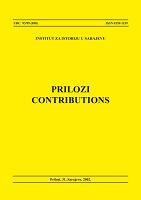Historijske i historiografske kontroverze i dileme nacionalnog nominiranja u Bosni i Hercegovini
Historical and HistoriographicControversies and Dillemas Relating Names and Nations in Bosnia and Herzegovina
Author(s): Vera Kržišnik-BukićSubject(s): History
Published by: Institut za istoriju
Keywords: Bosnia and Herzegovina; ethno-nomination
Summary/Abstract: The author of this paper considers the issue of ethno-nomination in BiH. The act of ethno-nomination serves to her as the instrument by which it is possible and even necessary, on one hand, to analyze and explain the complexity of ethnic/national development as such and, on the other, to see in the process itself the essence of the specific history of this country. Fatal intertwining of the social spheres of religion and ethnicity that lasted through all the period from the Middle Ages to the modern days has been reflected in the procedural acts of ethno-nomination. This latter is, according to the author, of crucial significance for the understanding of both the national themes in Bosnia as well as - to great extent - for its entire history. The history of Bosnia is thus followed based on the criteria of ethno-nomination that was either in force or was prevalent in different historical periods. Given the relatively early historical shaping of the three main social groups in the usual relations: Islam=Muslims religion-wise/Muslims in ethnic terms/Bosniaks; Orthodox Christians=Serbs, Catholic Christians=Croats, the prevailing matrix was the religious one. Much more rarely and in terms of historical sequence only secondarily, but quite logically emerging ion the everyday social use, was there the domination of opposite direction: as soon as someone is a Serb, he is automatically Orthodox Christian, etc.The author follows the historical processes of denomination of Muslims/Bosniaks, (Bosnian) Serbs and (Bosnian) Croats in different historical phases, explaining them by way of a broader social and political reasons of local social development in combination with international situation with regards to the political context of the neighboring countries. She pays special attention to the analysis of the paradox of lack of affinity of (Bosnian) Serbs and (Bosnian) Croats to the attribute “Bosnian” and tackles the issue of collective identity substance.
Journal: Prilozi
- Issue Year: 2003
- Issue No: 32
- Page Range: 297-313
- Page Count: 17
- Language: Bosnian

